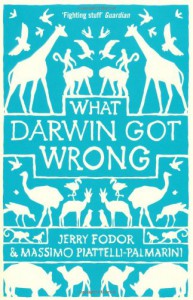What Darwin Got Wrong
 I hate to admit it, but I bought this book because of the covers. I was interested in the theme, but the real reason I immediately bought it and started reading it were the covers.
I hate to admit it, but I bought this book because of the covers. I was interested in the theme, but the real reason I immediately bought it and started reading it were the covers.As the authors put it, it is "an attack on the most influential scientific orthodoxy of the last 150 years". Although at times demanding a lot of attention, there are humorous parts, beginning with the introduction bearing the name "Terms of Engagement" :), as well as the Granny Gravity bit.
The authors claim that there might be something fatally wrong with the theory of natural selection. But please, natural selection, not evolution. I hate going into an argument about a book on the philosophy of biology only to realize that the person I'm talking to doesn't differentiate between evolution and natural selection. Which I also noticed in some reviews. That brings me to the next issue. Apparently, this work got a lot of negative feedback. If I understood correctly, from evolutionary biologists and people obsessed with creationism. Going back to my notes, I went along and downgraded it from 5 to 4 stars. Why? Because I realized there was I lot I didn't understand. I have a ton of notes on this book, and it would take me too long to get into it, but what matters is that I really liked it. After reading other reviews, I thought I should re-read it, because I obviously missed something. Or did they? I've been reading on evolution for the better part of the last ten years, and this book was extremely refreshing. Probably because it wasn't written by biologists. Now I don't consider myself any kind of an authority on these matters, and besides reading, I haven't really had the chance to sort out my standpoints (to myself or others) in a discussion or really breaking down some arguments. Some of the criticism seems "legit", other like they haven't even read the book. But as far as changing your perception goes, this book does it for me. After reading so many of the Darwin's bulldogs' books, it's exciting to start reading Lewontin, as well as non-biologists' takes on these themes in biology - a look from "the other culture" (the humanities one), if you will.
The references are recent (mostly from 2000 to 2009) and they present excerpts from the most up-to-date literature and scientific facts. (Which others call quote picking.) It is really interesting.
I'm just going to add some quotes, and you can think what you like about it. About selfish genes, they quote (somebodys? my notes are not good): "To consider genes as independent units is meaningless from the physiological as well as the evolutionary viewpoint"; "Advocacy of the gene as the unit of selection is operationally incoherent and genetically misconceived". On evolution in general: "Selection involves whole phenotypes, not individual traits"; "Evo-devo revolution has stressed that evolution is essentially the evolution of the arrow that connects the genes and the phenotype." On the intentionality of natural selection: "Darwin thought that he could start with a mental process and then get to natural selection by abstracting the minds away. But that is what we are saying can't be done."; "Fiddlesticks. The human mind wasn't created, and it wasn't designed, and there is nothing that natural selection cares about; natural selection just happens. This isn't Kansas, Toto."
Read it, if only to find new interesting authors. There are other biologists out there besides Richard Dawkins!
P.S. I guess we are all reacting to this book in response to the accumulated annoyances from before. An idea by a Croatian author is that particular stances and positions in the evolutionary theory have a lot to the with the persons' socio-economical background and political affiliations - basically, that everybody sees what they'd like to see. I'm beginning to think it is for the most part true.



